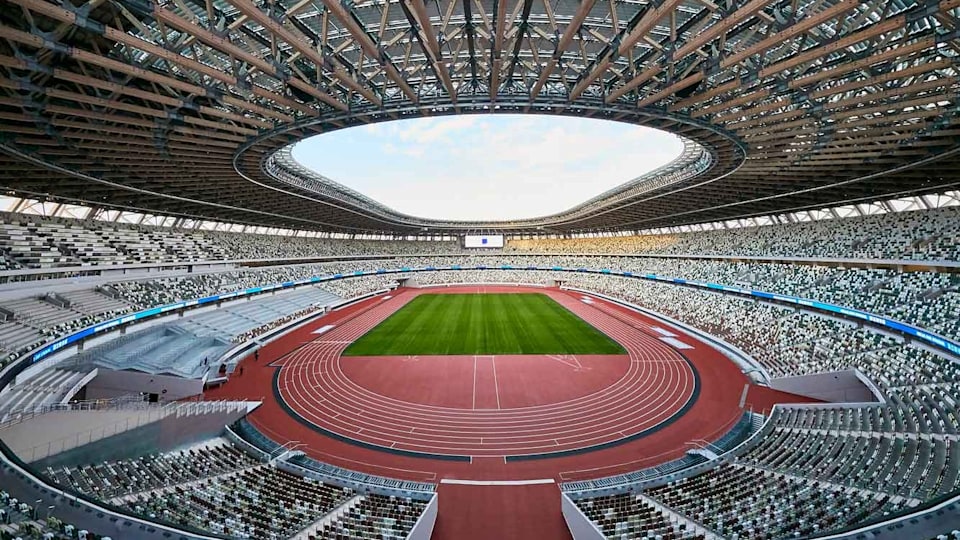Olympic venues at Tokyo 2020: Top 10 things to know
Which of the venues in Japan that will house the Games are iconic? The most unique? Or historic? Find out here.

Take your pick.
Forty-two in all, 25 previously existed, 10 temporary and eight built from scratch. The venues that will stage the Tokyo 2020 Olympic Games come in all shapes and sizes, something for everyone.
While all are essential in the delivery of the Games, here's 10 of them with a particular point of difference:
Olympic Stadium
Locals just call it koku-ritsu - meaning "National".
Undoubtedly the metonym of Tokyo 2020, the 68,000-seater is built on the same premises as the main stadium of Tokyo's last Games in 1964.
The old stadium was used to showcase the country's biggest sporting and entertainment events until it was torn down for the new one, which was completed in November 2019.
The Kuma Kengo-designed Olympic Stadium has a natural, wooden tone to it and fits right in the Meiji Jingu Gaien district, a heaven for runners including internationally acclaimed writer Murakami Haruki.
The ground is Japan's answer to a Wembley, Maracana or the Bird's Nest, and will host the Opening and Closing Ceremonies as well as the athletics and football competitions.
It is also a stone's throw away from another Olympic venue, Tokyo Metropolitan Gymnasium, which will hold the table tennis.
Yoyogi National Gymnasium
Still one of the most beloved pieces of architecture in the city, this arena was also built for the 1964 Games to house swimming and diving events. For Tokyo 2020, it will be home to handball and in the Paralympics, wheelchair rugby and badminton.
The venue is the work of world-renowned architect Tange Kenzo, whose design at the time was seen as an industry marvel.
Construction began in February 1963 and a 24/7/365 operation was required to complete it - only 39 days before Tokyo 1964 opened. For his contribution, Tange was specially decorated by then International Olympic Committee President Avery Brundage.
The gymnasium is nestled in between Tokyo's trend hubs Shibuya and Harajuku.
Nippon Budokan
Alongside the Yoyogi National Gymnasium, the mecca of judo is arguably the most iconic of the Tokyo 2020 venues.
The Budokan introduced judo to the Olympic programme in 1964 and will red-carpet another new sport to the Games this summer - karate.
The Budokan is tested and Games ready, having hosted the 2019 world judo championships amid nearly two years of renovation work.
Oh, and the Beatles played here.
And Cheap Trick.
And Muhammad Ali fought Japanese pro wrestling legend Antonio Inoki.
And...
International Stadium Yokohama
A seasoned venue of world-class sporting events such as the finals for the 2002 FIFA World Cup and 2019 Rugby World Cup, the stadium is the largest in Japan with a capacity of 72,327.
Around an hour away from central Tokyo, International Stadium Yokohama is home to the J.League's Yokohama F Marinos. Fittingly, the football competition will be held here.
Kokugikan Arena
The Tokyo home to the Japanese national pastime sumo, the Kokugikan will stage boxing this summer.
Located in the old Tokyo ward of Sumida-ku, sumo fans regularly pack the arena and after the bouts, head out in the neighbourhood for some vintage chanko-nabe, irresistible hot-pot dishes preferred by the wrestlers to put on weight.
A trip to the Kokugikan is indeed a once-in-a-lifetime experience, both in and out of the venue.
Tokyo Aquatics Centre
Within walking distance of the old spiritual home of Japanese swimming, Tatsumi International Swimming Center, is the new one - and it's nothing short of stunning.
The Aquatics Centre was the last of the eight newly built venues to be completed, in February 2020.
The length and width of the state-of-the-art main pool are adjustable, and test swimmers who have taken a dip say it's a fast course, hinting at potential records galore come the Games.
While a crowd has yet to be let in because of Covid protocols, no seat in the stands is too far from the action. With the Japanese delegation traditionally winning a bulk of their medals in swimming, the atmosphere could be electric during competition.
Ariake & Aomi Urban Sports Park
The two parks will breathe new life into the Games with a touch of the youth movement.
Ariake introduces BMX and skateboarding while Aomi paves the way for 3x3 basketball and sport climbing.
By Tokyo Bay and near the Athletes' Village, all signs point to the park concept being a smash hit locally with strong Japanese medal hopefuls in the new sports.
Tsurigasaki Surfing Beach
While far removed from the Tokyo clusters in Ichinomiya, Chiba Prefecture, this "venue" could offer some of the Games' most scenic moments as surfing makes its Olympic debut.
A hotbed for Japanese surfers even before the town was awarded the sport, the experience here is certain to be unlike any other.
Sapporo Odori Park
A late comer to Tokyo 2020, Sapporo Odori Park was appointed to host the marathon and walking events in December 2019.
In Japan's northernmost island of Hokkaido, the dry Sapporo summer should ease some of the physical burden on the athletes.
A 20-kilometer loop course in the dead-centre of the city has been laid out and should encapsulate the crowd, particularly for the marathon which is one of the most popular Olympic events in Japan.
Fukushima Azuma Baseball Stadium
Last but not least, the Tokyo 2020 Olympic Games will get under way here on 21 July with the Games reprisal of softball on what should be an emotional, pensive day for Japan, who will host Australia.
With recovery a theme for Tokyo 2020, no venue maybe more symbolic than Fukushima Azuma Baseball Stadium situated in a prefecture known for its beautiful countryside.
